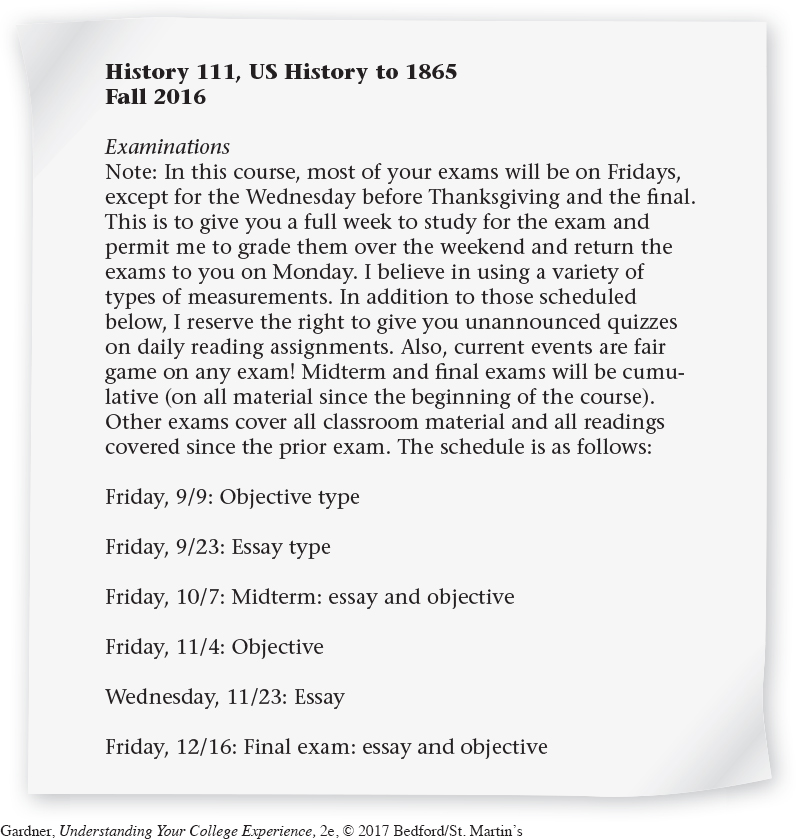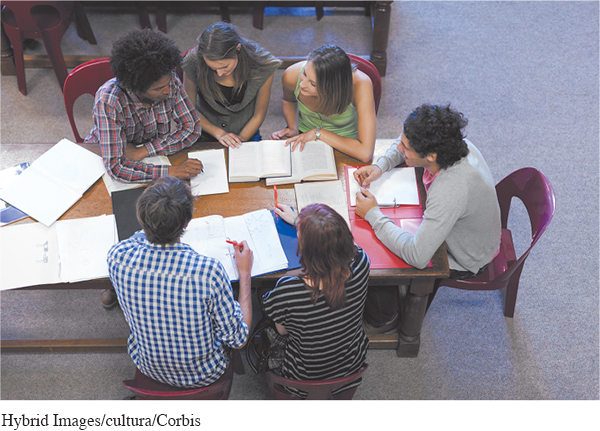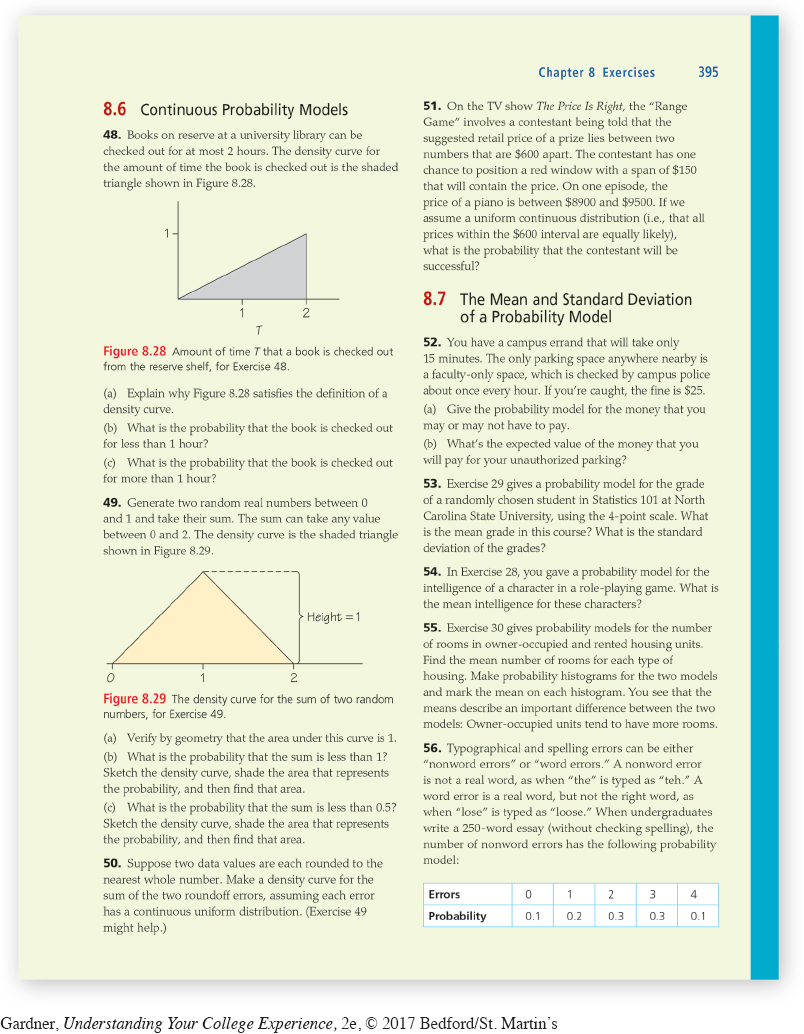8.1 GETTING READY . . .
173
Believe it or not, you actually begin preparing for tests on the first day of the term. Your lecture notes, assigned readings, and homework are all part of that preparation in addition to rest, diet, exercise, attitude, and more. As you get closer to the test day, you should know how much additional time you will need for review, what material the test will cover, and what format the test will take. It is very important to double-check the exam dates on the syllabus for each class, as in Figure 8.1, and to incorporate these dates into your overall plans for time management—for example, in your daily and weekly to-do lists. You should always build additional time into your schedule for test preparation and start reviewing the material early as emergencies can happen a day or two before the exam date. You may have to work extra hours or take care of your sick child, spouse, or parent (or yourself) and not have enough time to study, and as a result, you may not perform well on the test.

Prepare for Test Taking
174
Tests are usually a major portion of your grade in college, so proper preparation for them is essential. Of course you need to understand the material, but there are many ways you can prepare for exams in addition to your regular study routines.
Find Out about the Test. Ask your instructor about the test format, how long it will last, and how it will be graded. Find out the types of questions, the content that will be covered, and how much time you will have to complete the exam. Talk with your instructor to clarify any misunderstandings you might have about your reading or lecture notes. Adjunct instructors may not have offices or office hours, but you can usually talk to them before or after class. Some instructors might let you view copies of old exams so that you can see the types of questions they use. Never miss the last class before an exam; your instructor might use part or all of that class session to summarize and review valuable information.
Design an Exam Plan. Use information about the test as you design an exam plan. Create a schedule that will give you time to review for the exam without waiting until the night before. Develop a to-do list of the major steps you need to take to be ready, and schedule review dates. Be sure that your schedule is flexible enough to allow for unexpected distractions or emergencies. If you are able to schedule your study sessions over several days, your mind will continue to process the information between these sessions, which will help you during the test. Be sure you have read and learned all the material by one week before the exam. That way, you can use the final week to review. In that final week, set aside several one-hour blocks for review and make specific notes on what you plan to do during each hour. Also, let your friends and family know when you have important exams coming up and how that will affect your time with them.
Use Online Quizzing. Many textbooks have websites available that offer a number of study tools such as flash cards, videos, or online quizzes. Ask your instructors about these sites and also check the preface of your textbooks for information on accessing these sites. You might also use Google to find them. Students who are using digital textbooks will likely find integrated into every chapter quizzes that allow you to test your understanding of the material. Instructors often track completion of these quizzes.
175
Join a Study Group. Joining a study group is one of the best ways to prepare for exams. Group members can share and review the most important topics, quiz one another on facts and concepts, and gain support from other serious students. Some instructors will provide time in class for the formation of study groups, or you might choose to approach classmates on your own. Your campus learning center may also have a system for organizing study groups. You can always ask your instructor, academic adviser, or college’s tutoring or learning center to help you find other interested students and decide on guidelines for the group. Study groups can meet throughout the term, or they can just review for midterms or final exams. Group members should prepare questions or discussion points before the group meets. If your study group decides to meet just before exams, allow enough time to share notes and ideas.
Talk to Other Students. Other students, especially those who have taken a course you are currently taking from the same instructor, may be able to give you a good idea of what to expect on tests and exams. If your college is small, you shouldn’t have any trouble finding students who have taken the same courses you are taking now. If you’re at a large college, your instructor may be able to suggest a former student who could serve as a tutor. But keep in mind that your instructor may decide to take a different approach in your class than he or she did in past classes. Instructors are not trying to be “sneaky” or “trick” the students; they sometimes just decide to change their approaches to teaching and testing.
Get a Tutor. Most colleges offer free tutoring services. Ask your academic adviser, counselor, or college learning center about arranging for tutoring. Keep in mind that some of the most successful students seek out tutoring, not just students who are struggling. Most students who receive tutoring do well in their courses. Many learning centers employ student tutors (also called peer tutors) who have done well in the same courses you are taking. These students might have some good advice on how to prepare for tests given by particular instructors. If you do well in a particular course, you could eventually become a peer tutor and be paid for your services. Serving as a peer tutor also deepens your own learning and helps you become more successful.

Prepare for Math and Science Exams
176
Math and science exams often require additional and sometimes different preparation techniques. Here are some suggestions for doing well on these exams:
Do your homework regularly even if it is not graded, and do all the assigned practice problems like those shown in Figure 8.2. As you do your homework, write out your work as carefully and clearly as you will be expected to do on your tests. This practice will allow you to use your homework as a review for the test.
Attend each class, always be on time, and stay for the entire class. Many instructors use the first few minutes of class to review homework, and others may end the class by telling you what will be on the test.
Build a review guide throughout the term. As you begin your homework each day, write out a problem from each homework section in a notebook that you have set up for reviewing material for that course. As you review later, you can come back to these problems to make sure you have a problem from each section you’ve studied.
Throughout the term, keep a list of definitions and important formulas and put these on flash cards. Review several of these as part of every study session. Another technique is to post the formulas and definitions in your living space (for example, on the bathroom wall or around your computer work area). Seeing this information frequently will help you keep it in your mind.

If none of these strategies seems to help you, ask a tutor to give you a few practice exams and review your responses with you.
Prepare Physically
Preparing physically for taking tests is as important as preparing emotionally and academically. The following strategies will help you prepare physically:
Maintain your regular sleep routine. To do well on exams, you will need to be alert so that you can think clearly. And you are more likely to be alert when you are well rested. Last-minute, late-night cramming does not allow you to get sufficient sleep, so it isn’t an effective study strategy. Most students need seven to eight hours of sleep the night before the exam.
177
Follow your regular exercise program. Exercise is a positive way to relieve stress and to give yourself a needed break from long hours of studying.
Eat right. Eat a light breakfast before a morning exam, and avoid greasy or acidic foods that might upset your stomach. Limit the amount of caffeinated beverages you drink on exam day because caffeine can make you jittery. Choose fruits, vegetables, and other foods that are high in energy-rich complex carbohydrates. Avoid eating sweets before an exam; the immediate energy boost they create can be quickly followed by a loss of energy and alertness. Ask the instructor whether you may bring a bottle of water with you to the exam session.
Prepare Emotionally
178
Just as physical preparation is important, so is preparing your attitude and your emotions. You’ll benefit by paying attention to the following ideas:
Know your material. If you have given yourself enough time to review, you will enter the classroom confident that you are in control. Study by testing yourself or quizzing others in a study group to be sure you really know the material.
Practice relaxing. Some students experience upset stomachs, sweaty palms, racing hearts, or other unpleasant physical symptoms of test anxiety. The section on test anxiety later in this chapter includes an anxiety quiz; if that quiz reveals that test anxiety is a problem for you, consult your counseling center about relaxation techniques. Some campus learning centers also provide workshops on reducing test anxiety.
Use positive self-talk. Instead of telling yourself, “I never do well on math tests” or “I’ll never be able to learn all the information for my history essay exam,” make positive statements, such as “I have always attended class, done my homework, and passed the quizzes. Now I’m ready to do well on the test!”
Be resilient. If you have had a poor grade on a particular kind of test before, know that you can bounce back. Don’t let one bad grade get you down.
YOUR TURN > WORK TOGETHER

Do you sometimes predict that you’ll do poorly on a test or exam, even when you’ve studied hard? Discuss with a small group of your classmates how a positive attitude can help you do your best.